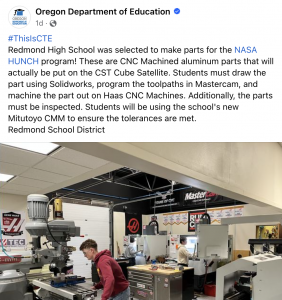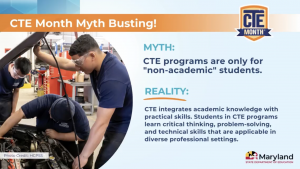This week President Biden delivered his annual State of the Union address to a joint session of Congress. Elsewhere, lawmakers continued to make progress on federal funding while the U.S. Department of Labor made new apprenticeship announcements.
President’s State of the Union Address
 This week both the House and Senate were in session ahead of a new funding deadline and the President’s annual State of the Union address to a joint session of Congress last night. The President’s address to Congress featured a range of topics, including how recent federal bipartisan legislation focused on infrastructure and the nation’s advanced manufacturing capacity have helped to spur greater demand for skilled workers. Notably, the President highlighted the importance of Career Technical Education (CTE) noting that his administration is working to connect “…businesses and high schools so students get hands-on experience and a path to a good-paying job whether or not they go to college.”
This week both the House and Senate were in session ahead of a new funding deadline and the President’s annual State of the Union address to a joint session of Congress last night. The President’s address to Congress featured a range of topics, including how recent federal bipartisan legislation focused on infrastructure and the nation’s advanced manufacturing capacity have helped to spur greater demand for skilled workers. Notably, the President highlighted the importance of Career Technical Education (CTE) noting that his administration is working to connect “…businesses and high schools so students get hands-on experience and a path to a good-paying job whether or not they go to college.”
The President also highlighted a number of other education and workforce priorities including increasing college affordability, broadening access to early learning opportunities, and increasing access to after-school and summer programs. President Biden also called for the creation of a climate corps, modeled off the Peace Corps or AmeriCorps programs, to provide opportunities for individuals, especially youth, to gain experience in clean energy fields. A full transcript of the address is available here.
Congress Advances a New Appropriations Minibus
Earlier this week in the House, lawmakers formally advanced a package containing half of the dozen annual spending bills that compose the federal budget. The measure, known as a minibus, passed by a margin of 339-85. The legislation provides full-year funding for the remainder of the 2024 federal fiscal year (FY24) for several federal agencies including the Agriculture and Transportation Departments among others. The Senate is now in the process of considering this legislation ahead of a deadline later tonight when funding is set to expire for this slate of funding bills. While this measure is expected to clear the Senate and be signed into law by the President, the timing of passage remains uncertain at this time.
Once this effort is complete, lawmakers are expected to turn their attention to the remaining six funding bills that are still awaiting full-year FY24 funding. Among this tranche of funding bills is the House Subcommittee on Labor, Health and Human Services, Education, and Related Agencies (Labor-HHS-ED) funding measure, which provides funding for the U.S. Departments of Education (ED) and Labor (DOL), along with the programs that these agencies administer like the Carl D. Perkins Career and Technical Education Act (Perkins V) and the Workforce Innovation and Opportunity Act (WIOA). Funding for this portion of the federal budget is currently set to expire on March 22. Agreement on this slate of funding bills is still forthcoming.
Although the FY24 process is not yet complete, President Biden is expected to release his FY25 budget request to Congress this Monday, March 11. As the FY24 appropriations process begins to wind down and as FY25 formally begins, Advance CTE will continue to advocate for a strong investment in Perkins V’s basic state grant program and other funding streams that support high-quality CTE programs and related opportunities.
Advance CTE Executive Director Appointed to Apprenticeship Advisory Committee
This week, DOL announced the appointment of a new cohort of leaders to serve on its Advisory Committee for Apprenticeship. Advance CTE’s Executive Director, Kate Kreamer, was among those formally appointed to this important advisory role for the Department which will provide guidance and recommendations to the agency on apprenticeship policy over the next two years.
In addition to this announcement, President Biden issued an Executive Order (EO) this week aimed at expanding the use of apprenticeship programs within federal agencies and through federal grantmaking and contracting efforts. The EO includes the creation of an interagency task force to help formulate policies and strategies for the federal government to implement this directive, including prioritizing the hiring of individuals who complete registered apprenticeship programs (RAPs) and pre-apprenticeship programs. The order comes after the issuance of a  new Training and Employment Notice (TEN No. 23-23) outlining new expectations for pre-apprenticeship programs. Advance CTE is encouraged by these recent efforts and looks forward to providing formal comment on DOL’s recent proposal to overhaul regulations pertaining to RAPs and other apprenticeship models later this month.
new Training and Employment Notice (TEN No. 23-23) outlining new expectations for pre-apprenticeship programs. Advance CTE is encouraged by these recent efforts and looks forward to providing formal comment on DOL’s recent proposal to overhaul regulations pertaining to RAPs and other apprenticeship models later this month.
Steve Voytek, Policy Advisor



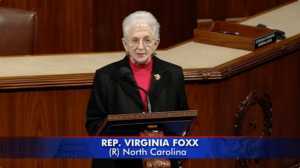
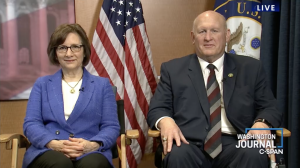
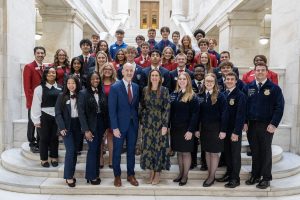
 Maine kicked off Career and Technical Education (CTE) Month at the State House with a showcase featuring learners, instructors, and directors from 15 of the state’s 27 CTE centers. The showcase featured learners’ advanced skills in areas from biotechnology and hospitality to welding and graphic design. Notably, every instructor and director at the event reported an increase in “non-traditional students” participating in CTE programs.
Maine kicked off Career and Technical Education (CTE) Month at the State House with a showcase featuring learners, instructors, and directors from 15 of the state’s 27 CTE centers. The showcase featured learners’ advanced skills in areas from biotechnology and hospitality to welding and graphic design. Notably, every instructor and director at the event reported an increase in “non-traditional students” participating in CTE programs. 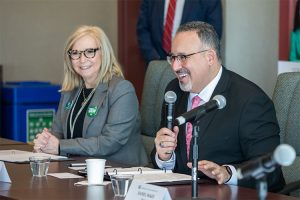 On February 21, U.S. Secretary of Education Miguel Cardona visited the Community College of Rhode Island (CCRI) as part of President Biden’s Investing in America Tour. The visit featured a tour of CCRI’s advanced manufacturing lab, a roundtable discussion with educational leaders, and dialogues with learners. Additional discussions took place with CCRI’s President Rosemary Costigan, Rhode Island Governor Dan McKee, and U.S. Representative Gabe Amo.
On February 21, U.S. Secretary of Education Miguel Cardona visited the Community College of Rhode Island (CCRI) as part of President Biden’s Investing in America Tour. The visit featured a tour of CCRI’s advanced manufacturing lab, a roundtable discussion with educational leaders, and dialogues with learners. Additional discussions took place with CCRI’s President Rosemary Costigan, Rhode Island Governor Dan McKee, and U.S. Representative Gabe Amo.  DACCTE Celebrates Poster Contest Winner
DACCTE Celebrates Poster Contest Winner